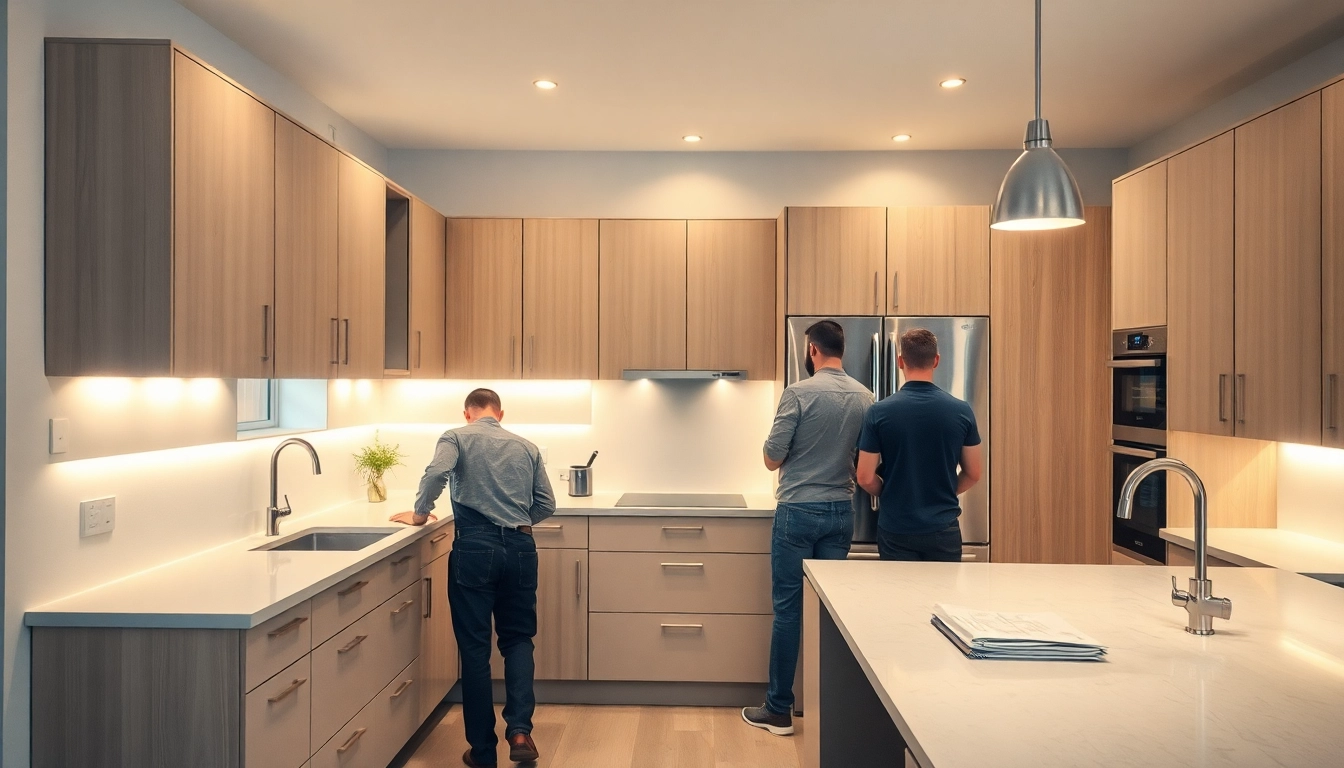Understanding the Role of Kitchen Fitters
What Do Kitchen Fitters Do?
Kitchen fitters, often called kitchen installers, are specialized tradespeople who handle the installation of kitchen units and appliances. They are responsible for transforming a space according to the designs provided by homeowners or interior designers. A typical day for a kitchen fitter involves measuring spaces, installing cabinetry, countertops, sinks, and appliances, and ensuring everything is connected and functioning correctly. Additionally, they might also handle tiling, plumbing, and electrical installations to varying extents, especially if they are experienced or certified in those areas.
Skills and Qualifications of Professional Kitchen Fitters
To become a successful kitchen fitter, certain skills and qualifications are essential. Typically, kitchen fitters should have:
- Technical Skills: Knowledge of various tools and techniques used in installation, including cabinetry, plumbing, and electrical systems.
- Attention to Detail: Precision is crucial, as any misalignment could lead to costly mistakes and unsatisfactory results.
- Problem-Solving Abilities: Unexpected challenges can arise during installations, and fitters must think on their feet to find solutions.
- Good Communication: They often liaise with homeowners, suppliers, and subcontractors, and must clearly convey ideas and gather feedback.
- Certifications: Many kitchen fitters complete apprenticeships or vocational training. Certifications in areas such as plumbing, electrical work, or carpentry can enhance their qualifications.
Why Hiring Expert Kitchen Fitters Matters
Hiring expert kitchen fitters ensures the process runs smoothly and the final product meets your expectations. Professional fitters bring years of experience and knowledge, enabling them to avoid common pitfalls that amateurs might face. Furthermore, expert fitters can offer valuable insights on design options, installation techniques, and the best materials to use, which can ultimately save time and money.
Choosing the Right Kitchen Fitters for Your Project
How to Evaluate Kitchen Fitter Credentials
When selecting a kitchen fitter, evaluating their credentials is crucial. Start by looking for:
- Licenses and Certifications: Ensure the fitter has valid licenses and pertinent certifications that demonstrate their ability to perform installation tasks safely and effectively.
- Experience and Portfolio: Check their previous work by requesting a portfolio or visiting completed projects. This gives insight into their style and quality of work.
- Reviews and Testimonials: Online reviews from past clients on platforms like Yelp or HomeGuide can provide valuable feedback regarding their professionalism and quality of service.
Questions to Ask Your Kitchen Fitters
Before hiring, consider asking potential kitchen fitters specific questions to gauge their expertise further:
- What is your experience with kitchen installations similar to mine?
- Can you provide references from previous clients?
- What is your workflow for a kitchen fitting project?
- How do you handle any unexpected issues that arise during installation?
- What warranties or guarantees do you offer on your work?
Where to Find Reliable Kitchen Fitters
Finding skilled kitchen fitters can be challenging, but several avenues can facilitate your search. Consider the following:
- Recommendations: Ask friends, family, or coworkers who have recently renovated their kitchens.
- Online Platforms: Websites like kitchen fitters and MyBuilder can help connect you with local professionals.
- Trade Associations: Membership in professional associations often means strict adherence to industry standards, thus ensuring reliability.
Common Challenges When Working with Kitchen Fitters
Managing Your Kitchen Fitting Budget
Staying within budget while renovating your kitchen is often one of the most challenging aspects. To manage it effectively:
- Get Detailed Quotes: Before starting any work, ensure you receive a comprehensive quote that includes all labor and material costs.
- Set a Contingency Fund: It’s wise to set aside an additional 10-20% of your total budget for unexpected expenses.
- Prioritize Changes: Determine which aspects of your kitchen renovation are essential, and which can be adjusted or delayed.
Addressing Timeline Issues with Kitchen Fitters
Delays can be common in kitchen fitting projects, often resulting from supply chain issues or unforeseen complications. To address these:
- Clear Communication: Regularly communicate with your kitchen fitter to stay informed about the project’s progress and any anticipated delays.
- Set Realistic Timelines: Work with your fitter to establish a timeline that accounts for potential hiccups.
Navigating Design Changes during Installation
Design changes can occur during installations, leading to significant delays and increased costs. To navigate this aspect:
- Plan Thoroughly: Before installation begins, ensure you have finalized your design to minimize changes during the project.
- Be Flexible: Understand that some changes may be necessary, and discuss these with your kitchen fitter to find solutions that align with your budget and timeline.
Best Practices for Collaborating with Kitchen Fitters
Effective Communication with Your Kitchen Fitters
Effective communication lays the foundation for a successful kitchen fitting project. Regularly discussing progress, potential issues, and design preferences ensures that both you and your fitter are on the same page.
Setting Clear Expectations
Clearly outlining your expectations from the start helps to align both parties and reduce misunderstandings. Make sure to communicate your vision and any specific requirements you have for the project.
Regular Check-ins and Progress Assessments
Establish a schedule for check-ins, during which you can assess progress, discuss any concerns, and make necessary adjustments. This practice can help catch potential problems early on and foster collaboration.
Post-Installation Care with Your Kitchen Fitters
How to Maintain Your New Kitchen
Once your kitchen is installed, keeping it in good condition is crucial. Regularly clean surfaces, pay attention to appliances, and follow care recommendations from your fitter or the appliance manufacturer.
Warranty and Aftercare from Your Kitchen Fitters
Understanding the warranty on your installation work is essential. Most professional fitters offer a warranty period during which they will address any issues that arise. Be sure to clarify these terms upfront.
Planning for Future Upgrades
A kitchen is a long-term investment, and you should plan for future upgrades. Stay informed about trends and advancements in kitchen technology and design, as these can enhance your kitchen’s functionality and aesthetic appeal down the line.

